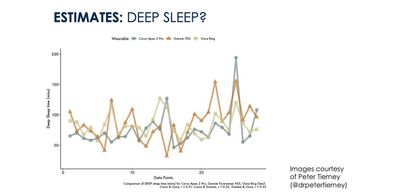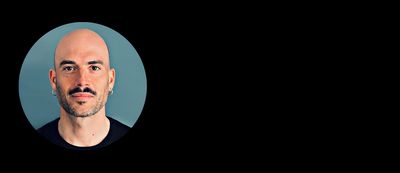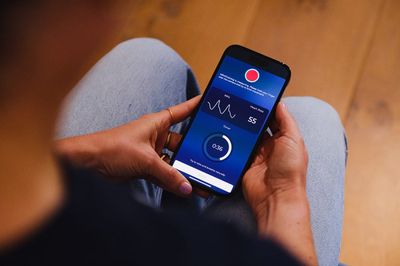
Adam Chamberlin
Head of digital development for Mackman Group. Aging consummate athlete attempting to run, bike and enjoy the outdoors.
Having worked in the cycling industry prior to a global pandemic I took up running to spend more time with my family. Since then I have caught the 'long run' bug and challenged myself.
Now back in the tech industry I am fascinated by using technology to help live a healthier and more sustainable life.
Day life is spent in WordPress and talking all things technical SEO.
hello@adamchamberlin.info
+447816905420
Head of Development
Mackman Branding
Hadleigh
Suffolk
United Kingdom
Liked QampA How Do You Track Sleep
I have received this question a few times, given some of my work, hence here it is:
I don’t use a wearable to track sleep. Why?
Accuracy isn’t there. Even “sleep time” is an estimate inferred from movement and a few proxies, often so obviously wrong (e.g., when I’m reading in bed), that wearing a device for this level of inaccuracy is not worth it to me (more about this, here). For stages, results are all over the place, unreliable, and dependent on the device you use, which obviously makes no sense if we want to evaluate the impact of an intervention.
[

The results of your intervention might show more or less deep sleep depending on which sensor you wear. Save your energies for something else.
Now, consider the issue at hand here: what you want to measure cannot be measured without looking at brain waves; hence, you are relying on a guess. Can it be decent for some people sometimes? Sure thing, not denying it. Is that up to my standards? Nope. Feel free to use it, of course, but we should be clear that sleep time is not measured at the wrist or finger.
And even if it were accurate, so what? What’s the actionability? How much “deep sleep” do you need? How should it change after a hard workout? Why? What can you actually do to shift it? We don’t have good answers, so you end up worrying about numbers that are rough guesses (or made-up entirely). Are you just being entertained?
This isn’t about “knowing better than the data,” - even though, for the sleep opportunity window, i.e., how many hours you spend in bed, yes, we do know better than the wearable does - but in general, my point is another one here: the question is whether the data adds anything to my health and performance. If it doesn’t, it’s a toy or a distraction.
What improves health and performance is good sleep hygiene, not tracking it. In fact, tracking sleep often leads to the opposite of good health. The “output” I care about is how I feel and perform; that’s how I integrate the inputs (habits, environment) and judge if changes helped.
Please don’t confuse the above with dismissing the importance of sleep. Sleep is critical. It is the one thing that matters and enables everything else in terms of health and performance. But that doesn’t mean we need tech to “track” it.
Do the basics:
Consistent bed/wake times
Enough hours for you
Fewer evening stressors (alcohol, late/heavy dinners, hard exercise, doom-scrolling)
A comfortable, cool, dark, quiet room
Then see if you feel and perform better over time when you are able to implement basic sleep hygiene.
Finally, if you want to measure something, measure physiology, morning heart rate and HRV (or even just how you feel), and pair it with context. In that framework, sleep is context (like training, alcohol, travel) influencing resting physiology or feel. That’s how I “track” sleep: I log subjective sleep quality and time in HRV4Training via the questionnaire. No extra device. No pretending to be precise when precision isn’t there. No distractions. Over time, this gives me actionable feedback on how my body is responding or how my behavior has changed (in terms of the sleep opportunity window, i.e., how many hours I spent in bed). That’s what matters.
Sleep tracking feels like technology in search of a problem: there’s no clear problem–solution fit for most people. If a metric doesn’t change a decision or a behavior, it’s not a tool; it’s a toy - sometimes a dangerous one if it can mess with your head. With sleep, the actionable levers are known (timing, duration, light, alcohol, late training), and I don’t need a wearable to apply them or to know the outcome (do I feel better?). Working on sleep tracking has been a fun technology project, but having done this work, and having used it, and having talked to many people whose health has been basically derailed by using these trackers, I currently do not think that sleep tracking can positively impact people’s health and performance - quite the contrary!
And please note that I do understand some love gamification and to see “scores”, but a made-up number is the furthest thing from what I would use to be engaged with my health. Often short-lived, foolish, giving the false impression of capturing some sort of holistic view (they don’t), eventually backfires easily, and can lead to the opposite outcome (orthosomnia). Does it work for some? Sure, at least for a while. Does that mean I should be on board with what I consider nonsense? Nope.
Well, I hope that gives you some perspective on my current thinking, and as usual, thank you for reading!
Further reading:
Wearables and sleep time: https://marcoaltini.substack.com/p/wearables-and-sleep-time
A framework to make better use of wearables
https://marcoaltini.substack.com/p/a-framework-to-make-better-use-ofHow wearables became tools of distraction
https://marcoaltini.substack.com/p/how-wearables-became-tools-of-distraction
Personal Coaching for Runners
If you are interested in working with me, please learn more here, and fill in the athlete intake form, here.
How to Show Your Support
No paywalls here. All my content is and will remain free.
As a HRV4Training user, the best way to help is to sign up for HRV4Training Pro.
Thank you for supporting my work.
[

Marco holds a PhD cum laude in applied machine learning, a M.Sc. cum laude in computer science engineering, and a M.Sc. cum laude in human movement sciences and high-performance coaching. He is a certified ultrarunning coach.
Marco has published more than 50 papers and patents at the intersection between physiology, health, technology, and human performance.
He is co-founder of HRV4Training, advisor at Oura, guest lecturer at VU Amsterdam, and editor for IEEE Pervasive Computing Magazine. He loves running.
Social:
Personal Substack
Instagram
[
